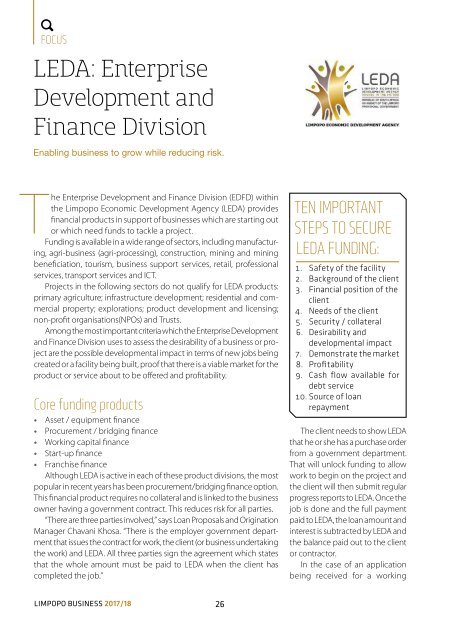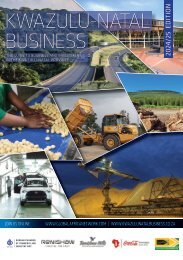Limpopo Business 2017-18 edition
A unique guide to business and investment in Limpopo. Limpopo Business 2017/18 is the ninth edition of this highly successful publication that has, since its launch in 2007, established itself as the premier business and investment guide to the Limpopo Province. This edition of Limpopo Business is officially endorsed by the Office of the Premier of Limpopo. This book contains detailed insights into the plans of the Limpopo Economic Development Agency (LEDA) and the recently launched bus rapid transport system for the provincial capital, Leeto la Polokwane, together with a comprehensive register of all provincial government and municipal contact details. Investment news related to mining, telecommunications and tourism is carried in overviews of all the main economic sectors. To complement the extensive distribution of the print edition of the magazine, the publication is also available online at www.limpopobusiness.co.za.
A unique guide to business and investment in Limpopo.
Limpopo Business 2017/18 is the ninth edition of this highly successful publication that has, since its launch in 2007, established itself as the premier business and investment guide to the Limpopo Province. This edition of Limpopo Business is officially endorsed by the Office of the Premier of Limpopo.
This book contains detailed insights into the plans of the Limpopo Economic Development Agency (LEDA) and the recently launched bus rapid transport system for the provincial capital, Leeto la Polokwane, together with a comprehensive register of all provincial government and municipal contact details. Investment news related to mining, telecommunications and tourism is carried in overviews of all the main economic sectors.
To complement the extensive distribution of the print edition of the magazine, the publication is also available online at www.limpopobusiness.co.za.
Create successful ePaper yourself
Turn your PDF publications into a flip-book with our unique Google optimized e-Paper software.
FOCUS<br />
LEDA: Enterprise<br />
Development and<br />
Finance Division<br />
Enabling business to grow while reducing risk.<br />
The Enterprise Development and Finance Division (EDFD) within<br />
the <strong>Limpopo</strong> Economic Development Agency (LEDA) provides<br />
financial products in support of businesses which are starting out<br />
or which need funds to tackle a project.<br />
Funding is available in a wide range of sectors, including manufacturing,<br />
agri-business (agri-processing), construction, mining and mining<br />
beneficiation, tourism, business support services, retail, professional<br />
services, transport services and ICT.<br />
Projects in the following sectors do not qualify for LEDA products:<br />
primary agriculture; infrastructure development; residential and commercial<br />
property; explorations; product development and licensing;<br />
non-profit organisations(NPOs) and Trusts.<br />
Among the most important criteria which the Enterprise Development<br />
and Finance Division uses to assess the desirability of a business or project<br />
are the possible developmental impact in terms of new jobs being<br />
created or a facility being built, proof that there is a viable market for the<br />
product or service about to be offered and profitability.<br />
Core funding products<br />
• Asset / equipment finance<br />
• Procurement / bridging finance<br />
• Working capital finance<br />
• Start-up finance<br />
• Franchise finance<br />
Although LEDA is active in each of these product divisions, the most<br />
popular in recent years has been procurement/bridging finance option.<br />
This financial product requires no collateral and is linked to the business<br />
owner having a government contract. This reduces risk for all parties.<br />
“There are three parties involved,” says Loan Proposals and Origination<br />
Manager Chavani Khosa. “There is the employer government department<br />
that issues the contract for work, the client (or business undertaking<br />
the work) and LEDA. All three parties sign the agreement which states<br />
that the whole amount must be paid to LEDA when the client has<br />
completed the job.”<br />
TEN IMPORTANT<br />
STEPS TO SECURE<br />
LEDA FUNDING:<br />
1. Safety of the facility<br />
2. Background of the client<br />
3. Financial position of the<br />
client<br />
4. Needs of the client<br />
5. Security / collateral<br />
6. Desirability and<br />
developmental impact<br />
7. Demonstrate the market<br />
8. Profitability<br />
9. Cash flow available for<br />
debt service<br />
10. Source of loan<br />
repayment<br />
The client needs to show LEDA<br />
that he or she has a purchase order<br />
from a government department.<br />
That will unlock funding to allow<br />
work to begin on the project and<br />
the client will then submit regular<br />
progress reports to LEDA. Once the<br />
job is done and the full payment<br />
paid to LEDA, the loan amount and<br />
interest is subtracted by LEDA and<br />
the balance paid out to the client<br />
or contractor.<br />
In the case of an application<br />
being received for a working<br />
LIMPOPO BUSINESS <strong>2017</strong>/<strong>18</strong><br />
26


















